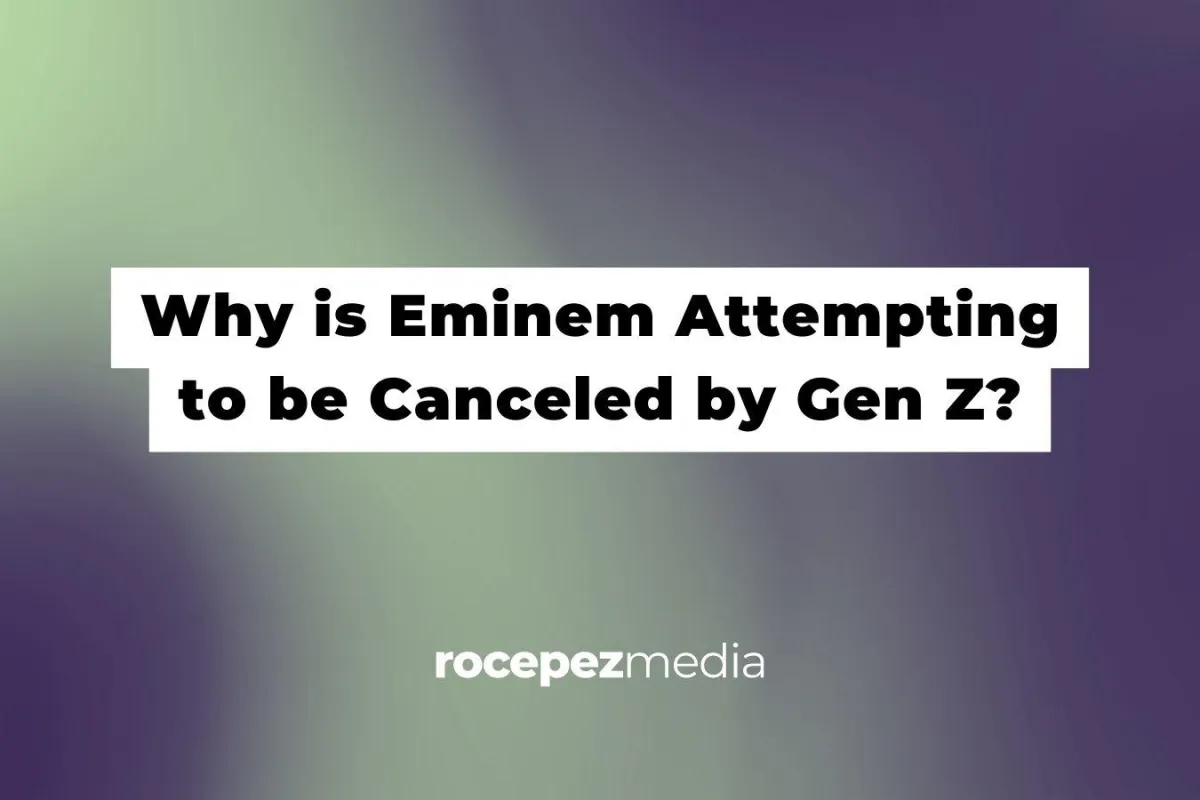
Why is Eminem Attempting to be Canceled by Gen Z?
The Unlikely Battle Between Eminem and Gen Z
In recent years, Eminem has once again found himself at the center of a cultural debate, but this time, the opponent is unexpected: Generation Z. The release of his album, The Death of Slim Shady, has sparked discussions across social media platforms, particularly on TikTok, where Gen Z has become the focal point of both mockery and misguided attempts at cancellation. But what exactly is going on? Why does Eminem, a figure once hailed as a rebellious voice of the younger generation, now appear to be seeking the ire of Gen Z? And more importantly, why does it seem like Gen Z simply doesn’t care?
Eminem's Legacy: A History of Controversy
To understand the current situation, we must first look at Eminem’s long history of controversy. Since the late 1990s, Marshall Mathers, better known as Eminem, has built a career on shock value. His alter ego, Slim Shady, is known for its unapologetic, often violent, and offensive lyrics, which have targeted everyone from pop stars to political figures. This brand of controversy helped Eminem solidify his place as one of the most influential and controversial figures in hip-hop.
For older generations—particularly Gen X and Millennials—Eminem's lyrics represented a form of rebellion against societal norms. He was a voice that spoke to their frustrations and disillusionment, albeit in a way that was often abrasive and divisive. However, the cultural landscape has shifted significantly since Eminem first rose to fame, and the issues that resonate with today's younger generation are vastly different from those that defined the eras of Gen X and Millennials. This shift has led to a disconnect between Eminem’s traditional fan base and the audience he seems to be attempting to provoke with his latest work.
The Release of The Death of Slim Shady: A Forced Attempt at Controversy?
When Eminem dropped his album The Death of Slim Shady, it quickly became apparent that the rapper was attempting to tap into the same formula that had worked for him decades earlier—using provocative and controversial lyrics to stir public discourse. However, this time around, the response was markedly different.
The album features tracks that seem designed to bait Gen Z, with references to modern social issues, internet culture, and even direct jabs at some of the generation’s most prominent figures and movements. But rather than sparking outrage, the album was met with indifference and, in many cases, confusion. Gen Z, it seems, is not easily provoked by the same tactics that once electrified Eminem’s career.
The generational shift in cultural values and priorities is a significant factor in this. Where Millennials and Gen X may have seen Eminem's shock tactics as a form of rebellion, Gen Z is more likely to view them as outdated and out of touch. The issues that matter most to Gen Z—such as climate change, social justice, and mental health—are not the same issues that Eminem’s music addresses, and his attempts to stir controversy feel forced in a landscape that has moved beyond his brand of shock value.
Gen Z's Response: Indifference and Mockery
Perhaps the most striking aspect of the release of The Death of Slim Shady is the lack of response from the very group Eminem seems to be targeting. Rather than engaging with the controversy or calling for Eminem to be "canceled," Gen Z has largely shrugged off the album, with many dismissing it as an irrelevant attempt to stay in the spotlight.
This indifference is reflected in the way Gen Z has responded on social media, particularly on TikTok. Rather than rallying against Eminem or launching a campaign to cancel him, many Gen Z users have taken to TikTok to mock the situation, creating memes and videos that highlight the absurdity of the generational divide.
One popular trend on TikTok involves Gen Z users pretending to be shocked and offended by Eminem’s lyrics, only to reveal that they are, in fact, unbothered by his attempts at controversy. These videos often use humor to illustrate the disconnect between older generations, who may still view Eminem as a provocateur, and Gen Z, who see him as a relic of a bygone era.
In another trend, Gen Z creators use soundbites from Eminem’s songs, juxtaposed with scenes of everyday activities or mundane tasks, to underscore how little impact his music has on their lives. The message is clear: Eminem’s attempts to provoke outrage are falling flat, and Gen Z is more focused on issues that matter to them than on the antics of a rapper from their parents’ generation.
Gen X and Millennials: Defending Their Icon
While Gen Z has largely dismissed Eminem’s latest efforts, the rapper has found staunch defenders in Gen X and Millennials. For many in these generations, Eminem is a cultural icon—a voice that spoke to their experiences and challenged the status quo in ways that resonated deeply. As a result, there has been a noticeable divide on social media, with older fans rushing to defend Eminem against perceived attempts at cancellation, even when those attempts are exaggerated or entirely fabricated.
This defense of Eminem by older generations highlights a broader cultural clash between Gen Z and their predecessors. While Gen X and Millennials may see Eminem’s music as an important part of their cultural heritage, Gen Z is more focused on addressing contemporary issues and is less inclined to revere figures from the past simply because of their historical significance.
This generational divide has led to a series of misunderstandings and miscommunications, particularly online. Many older fans mistakenly believe that Gen Z is actively trying to cancel Eminem, when in reality, the younger generation is simply indifferent to his attempts at controversy. This has only fueled the fire, with some older fans doubling down on their defense of Eminem, even as Gen Z continues to mock the situation.
The Larger Context: Cancel Culture and Generational Differences
The discourse surrounding The Death of Slim Shady and the perceived attempts to cancel Eminem cannot be separated from the broader context of cancel culture and generational differences in how it is perceived. Cancel culture, often defined as the practice of withdrawing support from public figures who have done or said something considered objectionable, has become a polarizing topic in recent years.
For many in Gen X and Millennials, cancel culture is seen as a threat to free speech and artistic expression. These generations grew up in a time when challenging societal norms was often met with resistance, and they may view cancel culture as an extension of that resistance—a way to silence voices that dare to speak out.
Gen Z, on the other hand, tends to see cancel culture differently. While there are certainly members of Gen Z who engage in cancel culture, many within the generation view it as a tool for accountability, particularly for those in positions of power. However, as the response to Eminem’s album demonstrates, Gen Z is not interested in canceling someone simply for the sake of controversy. Their focus is on meaningful change, and they are more likely to engage with issues that have a direct impact on their lives and the world around them.
Eminem’s Relevance in Today’s Cultural Landscape
The mixed responses to The Death of Slim Shady raise questions about Eminem's relevance in today's cultural landscape. While he remains a significant figure in the history of hip-hop and continues to have a loyal fanbase among older generations, it’s clear that his influence has waned with younger audiences.
Eminem's music, which once pushed boundaries and sparked debate, now feels out of step with the issues that matter most to Gen Z. This is not to say that Eminem's contributions to music and culture are no longer valuable, but rather that the world has changed, and with it, the cultural conversation has shifted.
For Eminem to remain relevant, he may need to adapt to these changes and find new ways to connect with younger audiences. This could mean addressing contemporary issues in a way that resonates with Gen Z or finding new ways to innovate within his music. However, as it stands, The Death of Slim Shady serves as a reminder that the tactics that once worked for Eminem may no longer have the same impact in a new cultural context.
Conclusion: What This Means for Brands Like rocepez media
The situation surrounding Eminem and his latest album offers valuable insights for brands and content creators. As the cultural landscape continues to evolve, it’s crucial for brands to stay attuned to the values and priorities of younger generations. What worked in the past may not resonate today, and understanding this is key to maintaining relevance and connection with your audience.
At rocepez media, we recognize the importance of adapting to these shifts in culture and communication. Just as Eminem's attempts to provoke controversy have shown the importance of understanding your audience, our approach to content creation is rooted in a deep understanding of what resonates with today’s consumers. Whether you’re looking to create content that speaks to Gen Z or any other demographic, our team is here to help you navigate the complexities of modern media.
Call to Action:
If you're interested in learning more about how to create content that connects with your audience, whether they are Gen Z, Millennials, or any other group, we invite you to book a Discovery Call with Ralph at rocepez media. Email Ralph at [email protected] to schedule your session today.
